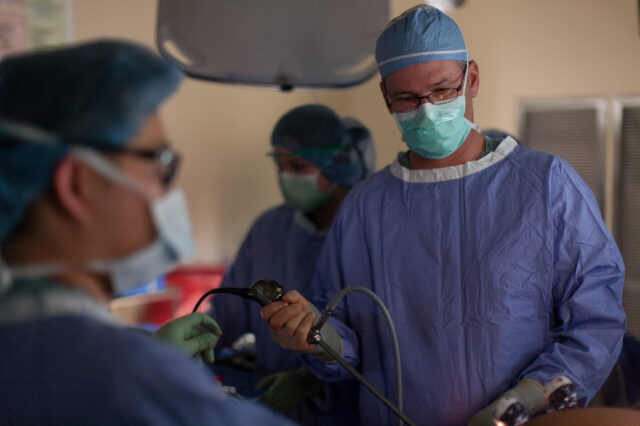Surgical Hope for Pancreatic Cancer

The diagnosis of cancer can be tough to process. But when diagnosed with pancreatic cancer, a disease commonly known to have low survival rates, patients find it hard to hold on to hope.
Steven Hughes, M.D., chief of the division of surgical oncology at University of Florida Health, provides innovative care for patients with pancreatic diseases.
“Perhaps the greatest challenge pancreatic cancer patients face today is the misconception that there is no hope after diagnosis,” Hughes said. “National statistics show that as many as 40% of patients with early pancreatic cancer that are candidates for surgery never even see a surgeon. We must alter this perception.”
UF Health consultations can provide hope and options for patients diagnosed with pancreatic cancer. Hughes emphasized that this is an important resource to acknowledge.
Patients with early pancreatic cancer could qualify for minimally invasive surgery, including the Whipple procedure, an operation that involves removing the head of the pancreas, the beginning of the small intestine, the gallbladder and the bile duct and reattaching the remaining organs to allow for normal digestion after surgery.
“One important point of this is that, in the right hands, surgery for pancreatic cancer has become very safe,” Hughes said. “In fact, most patients can qualify as candidates for minimally invasive (laparoscopic or robotic) surgical approaches, often referred to as key-hole or Band-Aid surgery.”
Hughes and his UF Health colleagues are highly experienced in Whipple procedures, performing a high volume of about 100 a year. To have the best outcome from this operation, the American Cancer Society recommends that patients seek a hospital that does at least 15 Whipple procedures per year.
“Individual expectations may vary, but the vast majority of patients can expect to return to a normal life within a month or two after these procedures,” he said.
The National Pancreas Foundation (NPF) recently named UF Health an NPF Center for excellence in pancreatic cancer treatment. The designation acknowledges high-quality approaches toward pancreatic cancer treatment.
“UF Health has a select team of surgeons devoted to pancreatic surgery, and our rates of use of robotic and/or laparoscopic approaches, outcomes and complication rates are among the best in the country,” Hughes said.
About the author
